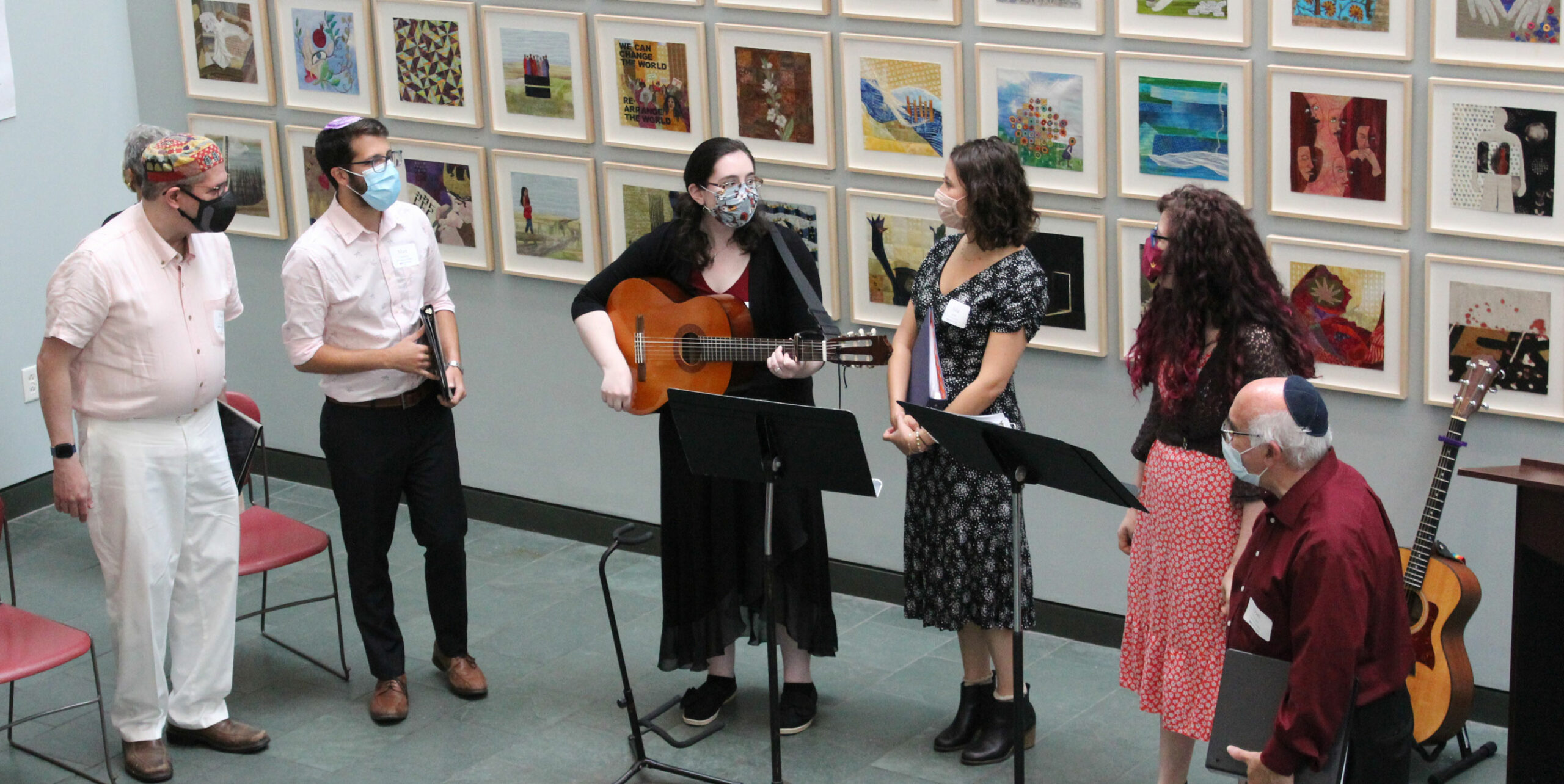Jewish learning Studying Music and Text:
A Sacred Relationship

(Above: Cantorial and rav-hazzan students sing at the “Seeing Torah” art exhibit opening)
Julia Sabra was drawn to the Hebrew College cantorial program because of the pluralism, the world-class faculty, and the personal attention of being in a small school.
An added benefit was studying side-by-side together with rabbinical students in chavrurta, paired discussion, debate, and dialogue, throughout her five years in the program.
“I didn’t want to put myself in a box. I really wanted to learn from and with people from many different backgrounds and expose myself to different sides of Judaism,” said Julia, a Mekorot, or preparatory ordination student, from Florida. “I have never engaged in this kind of study. It’s all new to me. I feel excited about what I’m learning. My cohort is wonderful. I love being in class with them. We’re all learning how to approach text study together.”
Hebrew College cantorial and rabbinical students are now integrated in the classroom more than ever before, studying and davening together; and preparing to be vibrant and inclusive spiritual leaders and teachers within two tracks of the same program.
“One of the great enhancements we’ve made is that core text study is now an integrated part of the cantorial program. Like our rabbinical students, cantorial students now study core texts throughout their five years in chavruta in our beit midrash,” said Cantor Lynn Torgove ’11, ’12, a Hebrew College cantorial alumna and Director of the Cantorial Program. “Cantorial classes are also open to rabbinical students, and rabbinical and cantorial students already sing together in Kol Arev, the Hebrew College chamber choir. It’s a great joining of two wonderful programs, and it is really unique to Hebrew College.”
“This new Hebrew College structure encourages rabbis and cantors to be in real dialogue with each other from the earliest part of their careers,” added Rabbi Dan Judson, Dean of Hebrew College Graduate Learning Programs. “For cantorial students, the increased time spent learning Jewish texts will deepen their Jewish knowledge and make them more effective teachers. Rabbinical students will benefit from an increased emphasis on Jewish music.”
In addition to taking text-based, pastoral and lifecycle courses together with rabbinical students, cantorial students study with leaders in their field. Courses include in-depth cantillation with Professor Josh Jacobson, composition and guitar with Cantors Jeff Klepper and Robbie Solomon, nusach with Cantor Brian Mayer, voice with Cantor Lynn Torgove, cantorial repertoire with Cantor Louise Treitman, and choral ensemble skills with Conductor Amy Lieberman.
“One of our strengths is the faculty,” said Professor Jacobson, one of the world’s leading authorities on Jewish choral music, founder and artistic director of the Zamir Chorale of Boston, and author of the comprehensive volume, Chanting the Hebrew Bible: The Complete Guide to the Art of Cantillation. “And, of course, cantorial students have the opportunity to study in classes with the rabbinical students and their awesome faculty.”
Judson said that the new structure will better prepare students to serve in congregations, where there is often a blurring of rabbinical and cantorial roles. “Cantors are frequently called upon to be teachers of Torah and providers of pastoral care, while rabbis are often expected to be musically talented leaders of prayer,” Judson said. “The integration of the rabbinic and cantorial programs will have a number of wonderful benefits for our students.”
“At Hebrew College having cantorial and rabbinical students studying together allows for the growth of sacred relationships, with each student sharing their individual gifts and skills and therefore each learning from, and with, each other,” added Cantor Marcie Jonas `10, who teaches in the program. “Ultimately, as these students become alumni and begin to serve their community as cantors or rabbis, it is this shared time together in the classroom from which the foundation of shared clergy responsibility grows.”
Second-year rabbinical student Naomi Gurt Lind said taking cantorial classes has deepened her familiarity with nusach, trope, and communal melodies, and expanded her network of supportive colleagues.
“Recently when I was choosing tunes for an upcoming service, I ran into a question of how to map the words onto a tune I wanted to use,” she said. “A quick flurry of text messages and voice notes with a cantorial student I knew from class answered this question and several other questions I didn’t even realize I had!”
Kochava Munro, a third-year cantorial student, says she is excited to have more opportunities to study texts together with rabbinical students.
“I love that cantorial students now have to take biblical Hebrew and grammar. That has really helped my understanding of Torah reading.” she said. “If new cantorial students take more of those classes, it will be really helpful and deepen our understanding of Mishna, Talmud and halacha overall.”
Photo Above: Cantorial students sing at the opening of the Seeing Torah art exhibit, a visual diary documenting artist Anita Rabinoff-Goldman’s study and artistic response to each of the 54 portions of the Torah over the cycle of a single Jewish year.

